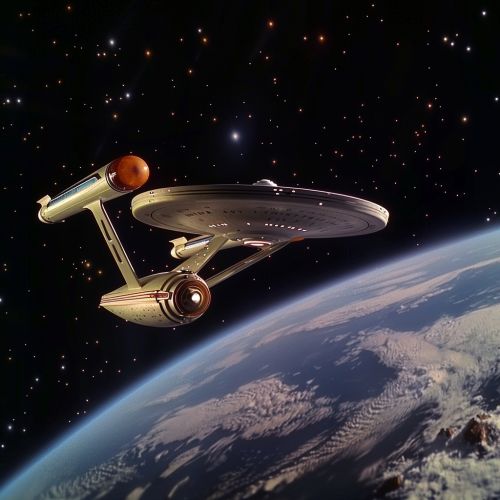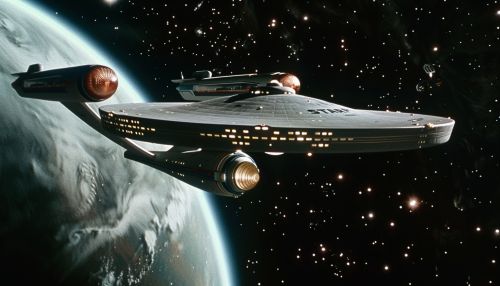Star Trek (film)
Plot


"Star Trek" is a 2009 American science fiction film directed by J.J. Abrams. It serves as a reboot of the original Star Trek franchise, featuring the iconic characters of the original series but set in an alternate timeline. The film follows the adventures of a young James T. Kirk and Spock as they join the crew of the USS Enterprise to combat the time-traveling Romulan, Nero, who seeks to destroy the United Federation of Planets.
The plot begins with the destruction of the USS Kelvin by Nero's ship, the Narada, which results in the death of George Kirk, James T. Kirk's father. This event creates an alternate timeline, diverging from the original Star Trek continuity. The film then follows the lives of Kirk and Spock from their troubled childhoods to their eventual meeting at Starfleet Academy.
Kirk, initially a rebellious and directionless young man, is inspired by Captain Christopher Pike to join Starfleet. Meanwhile, Spock faces prejudice on his home planet of Vulcan due to his mixed heritage, being half-human and half-Vulcan. Despite these challenges, Spock excels in his studies and becomes a respected officer.
The main conflict arises when Nero reappears and attacks Vulcan, using a device called "red matter" to create a black hole that destroys the planet. Spock's mother, Amanda Grayson, perishes in the destruction. The Enterprise, commanded by Pike, engages Nero, but Pike is captured. Kirk and Spock must overcome their differences to save Earth from a similar fate. They ultimately succeed, with Kirk assuming command of the Enterprise and Spock becoming his first officer.
Production
The development of the 2009 "Star Trek" film began in 2005 when Paramount Pictures sought to revitalize the franchise. J.J. Abrams was brought on board as director, with Roberto Orci and Alex Kurtzman writing the screenplay. The film aimed to appeal to both long-time fans and newcomers by respecting the original series' legacy while introducing a fresh narrative.
Casting was a critical aspect of the production, with Chris Pine selected to portray James T. Kirk and Zachary Quinto cast as Spock. The film also featured Karl Urban as Leonard McCoy, Zoe Saldana as Nyota Uhura, Simon Pegg as Montgomery Scott, John Cho as Hikaru Sulu, and Anton Yelchin as Pavel Chekov. Leonard Nimoy, who played Spock in the original series, reprised his role in a significant cameo, bridging the original and new timelines.
The visual effects were a major focus, with Industrial Light & Magic (ILM) providing the majority of the effects work. The design of the USS Enterprise was updated to reflect modern aesthetics while maintaining recognizable elements from the original series. The film's score, composed by Michael Giacchino, incorporated themes from the original series, adding a sense of continuity.
Themes
"Star Trek" explores several themes, including destiny, friendship, and the clash between logic and emotion. The alternate timeline allows the film to examine how different circumstances shape the characters' development. Kirk's journey from a reckless youth to a responsible leader highlights the theme of personal growth and the impact of mentorship.
Spock's internal struggle between his Vulcan logic and human emotions is a central theme, reflecting the broader conflict between reason and feeling. The film also addresses issues of identity and belonging, particularly through Spock's experiences on Vulcan and his relationship with his human mother.
The concept of sacrifice is prevalent throughout the film, with characters like George Kirk and Amanda Grayson giving their lives for the greater good. The destruction of Vulcan serves as a catalyst for Spock's character development and underscores the high stakes of the narrative.
Reception
"Star Trek" received critical acclaim upon its release, praised for its direction, acting, visual effects, and revitalization of the franchise. It holds a high rating on review aggregator sites like Rotten Tomatoes and Metacritic. Critics highlighted the performances of Pine and Quinto, as well as the film's ability to balance action with character-driven storytelling.
The film was a commercial success, grossing over $385 million worldwide. It garnered several awards and nominations, including an Academy Award for Best Makeup. The success of the film led to the creation of two sequels, "Star Trek Into Darkness" (2013) and "Star Trek Beyond" (2016), further expanding the rebooted universe.
Legacy
The 2009 "Star Trek" film is credited with reinvigorating the franchise, attracting a new generation of fans while satisfying long-time enthusiasts. Its success demonstrated the viability of rebooting classic science fiction properties for modern audiences. The film's alternate timeline, known as the "Kelvin Timeline," allowed for creative freedom while preserving the original series' legacy.
The film's influence extends beyond its immediate sequels, impacting other media within the Star Trek universe, including television series and novels. It also sparked renewed interest in the original series and its subsequent spin-offs, contributing to the enduring popularity of the Star Trek franchise.
